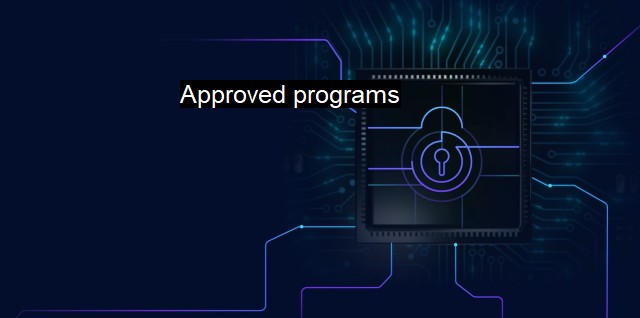What are Approved programs?
The Importance of Approved Programs in Protecting Against Cybercrime: Safeguarding Digital Environments Through Rigorous Vetting Processes and Advanced Security Protocols
Approved programs in the context of cybersecurity and antivirus refer to a specific list of software applications and processes that have been validated and sanctioned by an authoritative body, or a security administrator in a company network, for use on a computer or information network. These programs have been analyzed, and after withstanding rigorous checks for security threats and risks, they have been deemed safe or trustworthy for use.Cybersecurity encompasses the measures and techniques employed to protect internet-connected systems, software, and data, from potential cyber threats. The cyber-world is rife with different malicious programs and attacks such as viruses, trojans, worms, ransomware, to name just a few, making the deployment of cybersecurity measures an absolute necessity. One such effective measure is limiting the use of software applications and programs to ones that have been categorized as 'approved.'
Antivirus is a significant part of cybersecurity and constitutes software designed to detect and neutralize or remove malware (like viruses) that can hinder the performance or even safekeeping of data in a computer system. Reliable antivirus should feature regularly updated databases of all known (and potentially dangerous) malware forms and robust real-time protection against unauthorized programs. Also, a good antivirus is one that is approved and recommended for use by well-known cyber protection agencies or security administrators.
Unapproved programs might seem appealing due to their alluring features, user-friendly interface, or cost-effective nature (possibly even free). But running them carries the risk of creating vulnerabilities called 'backdoors' within the cybersecurity infrastructure. These are potential attack vectors which cybercriminals can exploit to gain unauthorized access into systems. Thus, approved programs are a cornerstone of cybersecurity strategy as they curtail this risk substantially.
Approved programs, especially in a professional setting, have to meet certain standards set by regulatory bodies. Examples of such standards are the ISO 27001, which covers information security best practices, and PCI DSS, typically employed by credit card companies to ensure secure online transactions. Using approved programs helps organizations becoming compliant with such regulations, leading to enhanced consumer trust and potential growth.
Approved Antivirus programs, on the other hand, generally must satisfy a common set of criteria including detection rates, false-positive rates, speed and ease of use. Independent organizations like AV-TEST and AV-Comparatives regularly analyze various antivirus programs for these factors and then issue approval for ones closely abiding by their benchmarks.
The value of using approved programs extends beyond just security considerations. When a program is approved, it is also likely to offer compatibility with other approved software, minimization of software conflicts, enhanced performance, and a seamless technology experience.
Using approved programs forms an essential part of an organization's cybersecurity strategy. Especially given the evolving landscape of cyber threats, sticking to approved software minimizes risk, guarantees compatibility, ensures adherence to regulation and consequently aids in maintaining a robust line of defence against potential cyber attacks.

Approved programs FAQs
What are approved programs in the context of cybersecurity and antivirus?
Approved programs are the software applications that have been tested and verified by cybersecurity experts and are known to be secure and free from any form of malware or virus. These programs are considered safe to use and are recommended by industry experts as effective tools in protecting against cyber threats.How can I identify if a program is approved for cybersecurity and antivirus purposes?
Generally, approved programs will carry an official stamp or logo from a trusted organization or institution, such as a cybersecurity firm or antivirus software company. It is important to always verify that the program in question has been evaluated and approved by a reputable organization before using it for cybersecurity and antivirus purposes.Are there any risks associated with using non-approved programs for cybersecurity and antivirus purposes?
Yes, using non-approved programs for cybersecurity and antivirus purposes can pose significant risks to your system and personal data. These programs may contain malware or viruses that can harm your system, steal your personal information, or compromise your online security. It is always advisable to use approved programs that are known to be secure and effective in protecting against cyber threats.Where can I find a list of approved programs for cybersecurity and antivirus purposes?
There are many resources available online that provide lists of approved programs for cybersecurity and antivirus purposes. Some of these resources include cybersecurity websites, antivirus software providers, technology blogs, and independent research firms. It is important to research and verify the credibility of any resource before using their recommendations for approved programs.| | A | | | B | | | C | | | D | | | E | | | F | | | G | | | H | | | I | | | J | | | K | | | L | | | M | |
| | N | | | O | | | P | | | Q | | | R | | | S | | | T | | | U | | | V | | | W | | | X | | | Y | | | Z | |
| | 1 | | | 2 | | | 3 | | | 4 | | | 7 | | | 8 | | |||||||